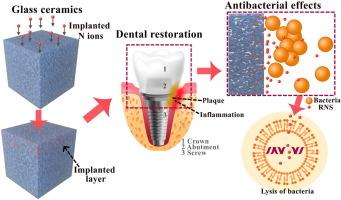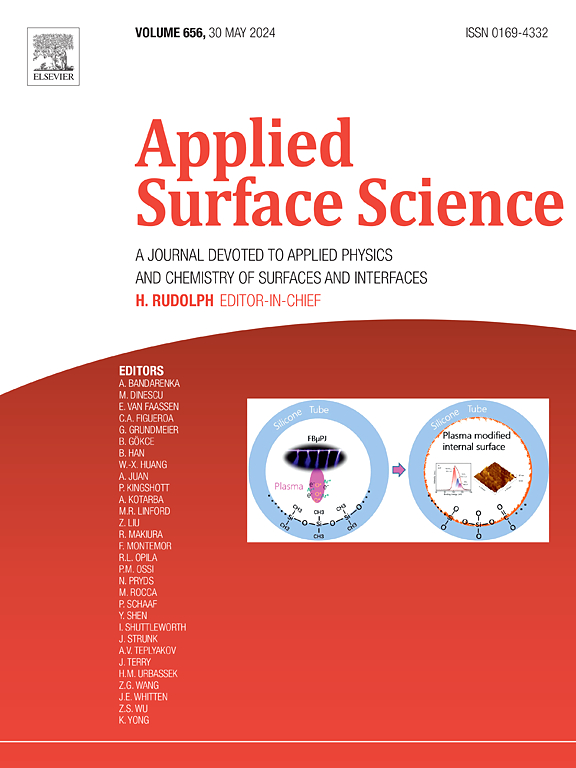离子注入 ZrO2-SiO2 玻璃陶瓷的 N 诱导抗菌能力
IF 6.3
2区 材料科学
Q2 CHEMISTRY, PHYSICAL
引用次数: 0
摘要
细菌积聚导致的牙周病是影响相关材料和种植体使用寿命的关键问题。提高玻璃陶瓷的抗菌性能仍然是一项重大挑战。由于 ZrO2-SiO2 玻璃陶瓷具有优异的机械性能,因此在牙科修复方面显示出巨大的潜力。在此,为了赋予 ZrO2-SiO2 玻璃陶瓷抗菌性能,我们采用了氮离子注入法对其表面进行改性。研究了氮通量对微结构、机械和抗菌性能的影响。结果表明,离子注入后发生了从四方相到单斜相的相变。在低通量离子注入下,样品出现了表面硬化。在 6.0 × 1017 离子/cm2 的最高通量下,观察到部分非晶化和起泡。XPS 分析表明,植入的氮离子主要形成 O-Zr-N、N-Si-O 和 Si-N 键。金黄色葡萄球菌测试表明,ZrO2-SiO2 玻璃陶瓷的抗菌性能在植入氮离子后得到增强,这可能与活性氮物种的形成有关。结果表明,氮植入可增强 ZrO2-SiO2 玻璃陶瓷的抗菌性能,而不会影响其机械性能。本文章由计算机程序翻译,如有差异,请以英文原文为准。

N-induced antibacterial capability of ZrO2-SiO2 glass ceramics by ion implantation
Periodontal disease caused by bacterial accumulation is a critical issue affecting the longevity of related materials and implants. Enhancing the antibacterial properties of glass ceramics remains a significant challenge. Due to their excellent mechanical properties, ZrO2-SiO2 glass ceramics have shown great potential in dental restoration. Here, to endow ZrO2-SiO2 glass ceramics with antibacterial properties, nitrogen ion implantation was performed to modify their surfaces. The effects of nitrogen fluence on the microstructural, mechanical and antibacterial properties were investigated. The results showed that phase transformation from tetragonal to monoclinic phase occurred after ion implantation. Surface hardening was observed in the sample under the low fluence ion implantation. Partial amorphization and blistering were observed at the highest fluence of 6.0 1017 ions/cm2. XPS analysis revealed that the implanted nitrogen ions mainly form O-Zr-N, N-Si-O and Si-N bonds. Staphylococcus aureus testing showed that the antibacterial properties of ZrO2-SiO2 glass ceramics can be enhanced after implantation, which may be attributed to the formation of reactive nitrogen species. The results show that nitrogen implantation can enhance the antibacterial properties of ZrO2-SiO2 glass ceramics without compromising their mechanical properties.
求助全文
通过发布文献求助,成功后即可免费获取论文全文。
去求助
来源期刊

Applied Surface Science
工程技术-材料科学:膜
CiteScore
12.50
自引率
7.50%
发文量
3393
审稿时长
67 days
期刊介绍:
Applied Surface Science covers topics contributing to a better understanding of surfaces, interfaces, nanostructures and their applications. The journal is concerned with scientific research on the atomic and molecular level of material properties determined with specific surface analytical techniques and/or computational methods, as well as the processing of such structures.
 求助内容:
求助内容: 应助结果提醒方式:
应助结果提醒方式:


